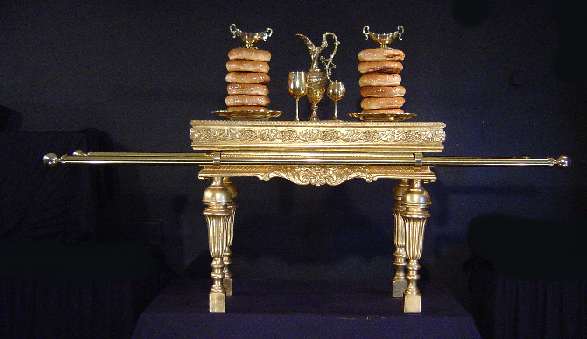 |
| http://www.mishkanministries.org/shewbread.php |
I’ve been reading about the directions given for various aspects of the tabernacle and service there, and the shewbread has sparked my interest.
And thou shalt set upon the table shewbread before me alway. (Exodus 25:30)5 ¶And thou shalt take fine flour, and bake twelve cakes thereof: two tenth deals shall be in one cake.7 And thou shalt put pure frankincense upon each row, that it may be on the bread for a memorial, even an offering made by fire unto the Lord.
Exodus 25:30 has a footnote for shewbread that says it was “bread of the faces” of “bread of the presence.” I started to wonder what meaning might be taken from this, and eventually I realized it meant to anticipate the sacrament when all covenant Israel would eat bread so that they would “always have His Spirit to be with them.” In Moses’ day only the priests ate the shewbread. I think they ate it on the Sabbath as they replenished the 12 loaves with new. This corresponds with eating the sacrament every week.
The 12 loaves were like the 12 tribes of Israel. Jesus was of Judah’s tribe.. but which loaf of the 12 is Judah’s? We aren’t to know. Jesus was among Israel becoming mortal, like us. I think the bread was also meant to symbolize the corporeal nature of Jehovah’s condescension to be born as a mortal among us and sacrifice His body for us.
For a while I wondered why the shewbread loaves were left for 7 days and then eaten and new loaves provided. I thought, The bread must get stale after 7 days sitting out! And the priests eat that, and put out new bread? And then I realized there’s a great lesson right there that corresponds perfectly to why we need the sacrament every week. The fresh loaves perfectly represent our newness of life after taking the sacrament. Then we go throughout the week and our resolve gets staler and staler and our soul kind of dries up, and by the end of the week we NEED to be renewed and refreshed! We need that staleness to be swallowed up and we need to be made new again, just like fresh bread. Just like the priests ate the bread so new bread can be put in its place, Christ as our high priest swallows up our staleness in His mercy, and makes us new again. I can testify to that. I've seen it in my life over and over and over again and I am SO grateful for it.
I also think the shewbread in the tabernacle gives us perspective as to the holiness of the sacrament, even though we eat it in church and not in our temples. It is like a map of where we are. It makes me think that maybe when we eat the sacrament we must imagine ourselves in the holy place of the tabernacle, next to the veil. I think we are to learn the Lord wants us to live at moral level as though we are always so near to God that He can hear us through that veil and we can hear Him. For we are certainly promised the presence of a member of the Godhead.
Continue reading at the original source →



